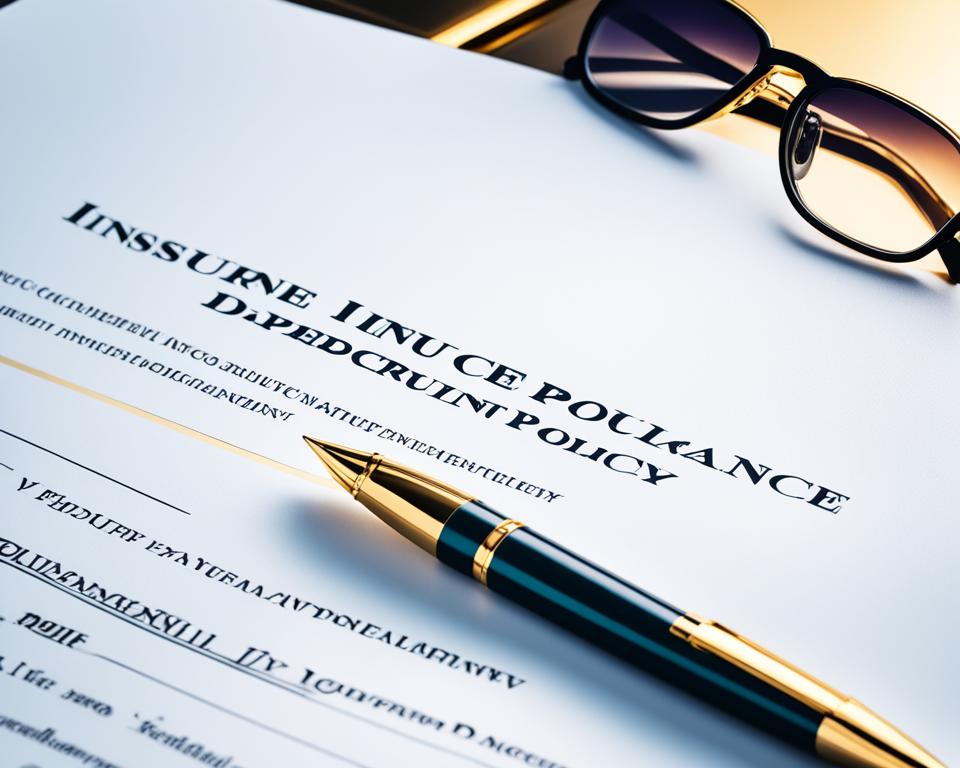Life insurance gives your loved ones financial protection if you pass away. This guide will help you learn the basics of life insurance. You’ll get to know about different types of policies, how to pay premiums, and what coverage options are available. We will share high-end advice we’ve crafted for the UK audience. This advice will help you make wise choices to secure your family’s future.
Prepare to dive into life insurance’s key points and find the best protection and coverage. You’ll learn about term and whole life insurances and explore their differences1. We’ll guide you through the maze of premium payments, death benefits, and how cash value grows1. If you aim to safeguard your family’s financial future or plan for your estate, this guide is for you. It offers knowledge and advice for making informed, sophisticated decisions.
Key Takeaways
- Understand the different types of life insurance, including term and whole life policies.
- Learn how to navigate premium payments and coverage options to meet your unique needs.
- Discover high-end, luxurious tips tailored specifically for the UK audience.
- Explore the role of life insurance in estate planning and minimizing inheritance tax.
- Gain insights into the factors that affect life insurance premiums, such as age, health, and lifestyle.
What is Life Insurance?
Life insurance is an agreement between a person and an insurance company. The person, or policyholder, pays money, called premiums. In return, their chosen beneficiaries receive a set amount if the policyholder dies. This payment is known as the death benefit.2 The main reason for life insurance is to offer financial comfort. It makes sure your family is secure even after you’re gone.2
Definition of Life Insurance
Life insurance is a way to look after your family financially. It gives a one-time payment, the death benefit, to your loved ones if you pass away.2 This money can replace the income you were bringing in. It can also help with final bills or give your heirs an inheritance.2
Purpose of Life Insurance
The main goal of life insurance is to bring financial peace to your family.2 It ensures they can keep living well, even if you’re not around. For example, it helps cover daily expenses, including your children’s needs.2 Life insurance can also handle end-of-life costs like funerals or any debts you leave behind.2
Types of Life Insurance Policies
Life insurance comes in two main forms: term and whole life. Term life covers you for a set time, like 20 years, and pays only if you die during that period.2 Whole life, on the other hand, can protect you for life as long as you pay the premiums.3 There are also different types of whole life, such as traditional, universal, and variable universal.3
Term life is usually cheaper but expires without a payout if you live past the term. Whole life costs more. Yet, it offers the chance to grow a cash value you can dip into later.3 This builds a saving account within your policy through either loans or withdrawals.2
Understanding Term Life Insurance
Term life insurance lasts for a set time, like 10, 20, or 30 years.1 It’s great for making sure your family is okay financially. This could mean paying off a house or looking after children.4
Level Term Life Insurance
Level term life insurance keeps the death benefit the same. It’s good for keeping your family’s finances steady.1 No matter when something happens, your family gets the same support.
Decreasing Term Life Insurance
Decreasing term life insurance has a benefit that gets smaller over time, like a mortgage.4 This type helps with mortgage payments. It matches the decreasing debt, making sure your family keeps the house if you pass away.
When picking term life insurance, look closely at what you need and for how long.4 By comparing level and decreasing term life insurance, you’ll choose what’s best for your family.
Exploring Whole Life Insurance
Whole life insurance is not like term life insurance. It doesn’t cover you for a set period. It provides you with lifetime coverage. This means your loved ones are protected no matter when you pass away, as long as you keep paying the premiums.5
Cash Value Accumulation
One big difference with whole life insurance is the ability to grow cash value over time. While term life insurance lacks this, whole life lets you save up money. You can use this saved money through loans or withdrawals. It offers financial flexibility and supports estate planning and minimizing inheritance tax.6

Lifetime Coverage
Whole life insurance offers lifetime coverage. So even if you pass away after the specific term, your loved ones are still protected. This is in contrast to term life insurance. That’s because it remains active for your whole life, provided you keep up with the premiums. It gives you peace of mind, knowing your family is secure.5
Knowing the special aspects of whole life insurance, like cash value accumulation and lifetime coverage, helps you choose wisely. You can pick what’s best for your needs and goals. This includes thinking about estate planning and inheritance tax too.
Life Insurance Basics
Life insurance has many key points you must know. These include different types of policies like term and whole life. You also choose how much coverage you want and the price, known as the premiums, you’ll pay.1 You pick people to get the money when you die. Understanding these basics helps you choose the right coverage for your family.
A life insurance policy is a promise between you and the insurance company. The company will pay a certain amount to the people you choose, your beneficiaries, when you pass away. This is in return for the regular payments, or premiums, you make during your life.1 There are two primary types of life insurance: term and whole life. Term lasts for a set time, like 20 years, while whole life lasts your entire life. Companies offer a range of policies and coverage amounts.
How much you pay for life insurance depends on many things. Your age and health are big factors. People who are younger and in better health usually pay less.7 Bad habits like heavy drinking or being overweight can make your premiums go up. The more coverage you want, the higher your premiums will be.7
It’s important to choose who will get the money from your life insurance when you die. These are your beneficiaries. You can make the process smoother by putting your policy into a Trust. This way, your money can be given out faster and might have fewer taxes.7 After you’re gone, your loved ones will start the process to get the insurance money. The company will check the paperwork and then pay out the benefit.
Factors Affecting Life Insurance Premiums
Life insurance premiums can vary due to many factors. It’s important to know these factors to make the best choice. This helps us protect our family with the right policy.
Age and Health Considerations
How old you are and how healthy you are really matter. Generally, younger and healthier people pay less for insurance. This is because they’re less likely to make a claim soon.8 Young and healthy folks are less risky for the insurance company.9
Coverage Amount and Term Length
The coverage amount and policy term length also affect how much you pay. If you choose more coverage or a longer term, your premiums will be higher. That’s because the insurance company has a bigger risk with you.9
Lifestyle Factors
What you do and how you live can change your insurance costs. Your job, hobbies, and if you use tobacco are important.8 If you do risky things like skydiving, you might pay more. The same goes for smokers – they pay more too.9
Knowing how these factors matter can help us choose wisely. It helps us get the right insurance that works for our lives and budget.

Beneficiary Designations and Claims Process
When you buy life insurance, it’s important to choose who gets the money when you’re gone.10 Make sure to update this info so your family or others get the help they need. You can pick anyone or anything that will get the total funds of your policy to 100%.11 This includes family, friends, charities, and even businesses you’re part of.11
If you pass away, the people you’ve picked will start the claim with the insurance company.10 They will check the papers and pay out the money. It’s wise to name some extra folks just in case. This can make things smoother later on.11 The company won’t find beneficiaries for you, though.11
Without a clear choice, the money might go to the estate or other close family members.10 This can lead to delays and expenses.10 So, it’s better to name who should get it directly. This can be people or organizations, but the rules vary by place.10
Remember to update this list if you marry, divorce, or someone on the list passes away.10 For someone needing special help, setting up a trust might protect them. This is vital for any government benefits they get.10 Keep checking this list, maybe every year, so that it’s always up-to-date.10
Life Insurance and Estate Planning
Life insurance is key in estate planning. It helps lessen the tax impact on the assets for your heirs. This can be done through smart policy structuring.
Life insurance also aids in asset distribution. You can name beneficiaries or put the policy in a trust. This way, your wishes are carried out.212
Minimizing Inheritance Tax
Insurance benefits can cover estate taxes, lowering the burden on your heirs.2 By adding a trust to your plan, you can reduce taxes further. It’s wise to get advice from legal experts for tax-smart plans that help your loved ones the most.12
Asset Distribution Strategies
Life insurance can be an important inheritance. Even if you don’t have much else to leave behind. This holds true especially with whole life policies.
Whole life policies are good for sharing business ownership. After you’re gone, they help make the transition smoother.12 For married couples, there’s survivorship insurance. It pays when both have passed. It’s often for children with special needs or to give back to charity.12
These strategies offer better control over wealth transfer. They also safeguard your family’s financial future for years to come.

Life Insurance Riders and Endorsements
Life insurance policies can be changed and made bigger with different add-ons called riders and endorsements.13 These let you adjust your life insurance to fit what you need and want it to do.
Critical Illness Riders
Imagine you get a critical illness. With a critical illness rider, you’d get a one-time payout.14 This payment can help with medical costs or other needs. It’s like an extra shield if a big health issue hits.
Accidental Death and Dismemberment Riders
If you face accidental death or loss of a body part, an accidental death and dismemberment rider would help.14 They’re good for people in dangerous jobs or activities. It makes sure your family is supported if the worst happens.
Choosing the Right Life Insurance Provider
Think about a life insurance company’s customer service, financial status, and policy choices when picking one.1 Choose companies with happy customers and good financial reviews from A.M. Best.1
Customer Service and Ratings
Good service is crucial for life insurance. It means your family gets help when they need it most.1 Check how happy customers are and if the company is financially strong. This helps ensure your family is supported well at tough times.1
Policy Customization Options
It’s also key to look into the policy options available.1 Find a company that lets you add or change things in your policy to match what you need.1 This makes sure you get a plan that fits your life and protects your family well.
Choosing carefully will give you peace that your family is looked after.1 Think about service, finances, and what policies you can adjust. This will help you make a smart choice for your family’s future.

Conclusion
Understanding life insurance is key to securing your family’s future financially.1 This guide covers different policy types and what affects premiums. It helps you choose the right life insurance coverage for you.
When picking term life insurance, whole life insurance, or other options, think of your family first. Work towards achieving financial security and peace of mind.15 Including life insurance in your estate planning is smart. It protects your family and ensures your wealth goes where you want.
Learn the key life insurance basics to make wise choices for your family’s future.1 With the right coverage and plan, you can secure your family’s financial future for the long term.
FAQ
What is life insurance?
What is the purpose of life insurance?
What are the main types of life insurance policies?
What is the difference between level term and decreasing term life insurance?
How does whole life insurance differ from term life insurance?
What factors affect the cost of life insurance premiums?
Why is it important to designate beneficiaries for a life insurance policy?
How can life insurance be used in estate planning?
What are some common life insurance riders and endorsements?
What should I consider when choosing a life insurance provider?
Source Links
- https://www.investopedia.com/terms/l/lifeinsurance.asp
- https://www.iii.org/article/life-insurance-basics
- https://www.ehealthinsurance.com/resources/affordable-care-act/life-insurance-basics
- https://www.postoffice.co.uk/life-cover/life-insurance/types
- https://caspianinsurance.co.uk/whole-life-insurance/types-of-whole-of-life-insurance
- https://www.nerdwallet.com/article/insurance/whole-life-insurance
- https://www.aviva.co.uk/insurance/life-products/life-insurance/how-does-life-insurance-work/
- https://www.forbes.com/advisor/life-insurance/factors-affecting-rates/
- https://www.investopedia.com/articles/investing/102914/7-factors-affect-your-life-insurance-quote.asp
- https://www.securian.com/insights-tools/articles/naming-a-life-insurance-beneficiary.html
- https://www.quotacy.com/a-guide-to-life-insurance-beneficiaries/
- https://trustandwill.com/learn/life-insurance-and-estate-planning
- https://www.investopedia.com/terms/r/rider.asp
- https://www.bankrate.com/insurance/life-insurance/life-insurance-riders/
- https://www.royallondon.com/guides-tools/life-insurance-guides/what-is-life-insurance/
